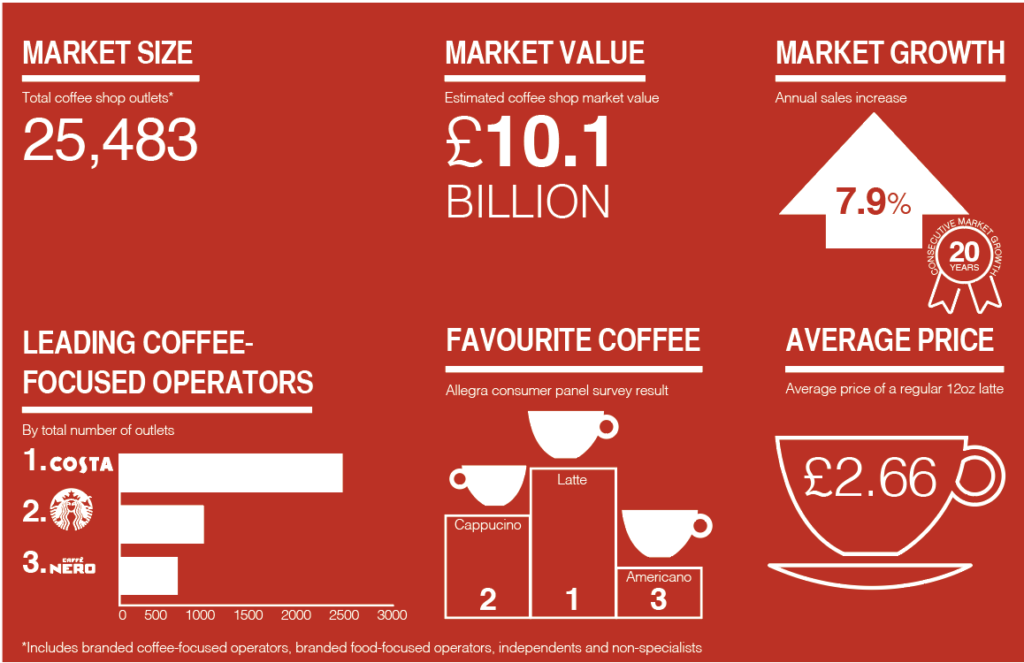Paul Hill takes a look at wholesale’s relationship with the profitable world of coffee shops
Worth £10.1bn, the 25,483 outlets that make up the UK coffee shop market grew by 7.9% in turnover during 2018, representing 20 consecutive years of sales and outlet growth. These findings stem from the Allegra World Coffee Portal’s annual report, and present a huge opportunity for wholesalers.
The humble coffee shop is now a staple of British culture, and as product range continues to grow beyond just hot beverages, it creates even more of a prospect to the entire channel. “There are a range of products that coffee shop outlets rely on wholesalers for,” explains industry expert David Gilroy. “Ground coffee, milk, chocolate, healthy snack bars, pastries and so on. Not to mention the supporting disposables: cups, lids, napkins, stirrers and sugar, on top of the professional cleaning and washroom solutions. One the biggest-selling lines is blue centrefeed roll.”
Research from insight business MCA’s Quarterly Food To Go Tracker also showed coffee shops to be one of the highest performing sectors after it increased its share across all areas of the food-to-go market.
This data comprises 6,000 consumer interviews every month, with the sample representative of 18+ UK adults in terms of age, gender and region.
Expecting more
It’s not just a wholesaler’s job to provide the burgeoning coffee shop market with products, Birchall Foodservice in Burnley even has a developmental chef that aids its coffee shops customers with menu ideas and inspiration, according to its marketing coordinator, Joe Moulton. “Consumers are expecting an element of visual theatre with their coffee. Granted, this isn’t the case for every coffee shop, particularly in budget locations, but as many people are now willing to pay more for a coffee than a pint of beer, I think they’re expecting a bit more from their baristas,” he says.
 Clare Ryal, sector controller for foodservice and wholesale at General Mills, echoes this. She also points out that coffee shops are now improving their food offerings to drive incremental sales, including expanding into vegan and vegetarian menus. “These diets are increasingly popular, especially in urban areas, and are seeing traction alongside the rise of responsibility, sustainability and ‘better for you’ trends – fuelled by 18-to-34-year-olds,” she says.
Clare Ryal, sector controller for foodservice and wholesale at General Mills, echoes this. She also points out that coffee shops are now improving their food offerings to drive incremental sales, including expanding into vegan and vegetarian menus. “These diets are increasingly popular, especially in urban areas, and are seeing traction alongside the rise of responsibility, sustainability and ‘better for you’ trends – fuelled by 18-to-34-year-olds,” she says.
“We’re currently working on a project with a popular coffee chain to launch something new on their menu this summer – watch this space.”
“As consumers become more educated on the role of nutrition in everyday snacking, they are demanding different products from a coffee shop environment,” adds Danielle Cartney, category manager at Nestlé Professional.
“Forty-five per cent of shoppers say they are looking for healthy snacks and 41% state they want snacks with less added sugar.
“While sales of traditional cereal bars are declining, snack bar sale growth is coming from new shoppers buying fruit & nut energy bars. We are also seeing an increase in consumers using coffee shops as flexible work spaces.
“Their needs differ from those in ‘leisure mode’, so a more significant range of healthier snacks is required to help them through a day of work.”
Teapigs is one supplier that has been riding the wave of the coffee shop revolution. Its co-founder, Louise Cheadle, believes the average tea drinker now wants more than just a ‘milk and two sugars’ kind of experience – something wholesalers need to be aware of.
“They know more about tea, they expect better quality and are happy to pay a bit more for it,” says Cheadle.
“Alternatives to standard black teas have really started to grow in recent years. There’s also been an increased concern around caffeine intake, and when coffee shops offer a good range of teas and infusions, this often leads tea to be the go-to option for many customers,” she adds.
As with all brands and businesses, it’s crucial to innovate and to differentiate yourself from competitors. This is why Thomas Ridley Foodservice works with suppliers to offer its coffee shop customers interesting new products, explains its sales director, Steve Lyons. “As a wholesaler, we do all the hard work by researching, sampling, negotiating etc. so we always have a raft of new and interesting products for our customers to stock,” he says.
“Coffee has done this really well. Interesting blends of coffee, plant milks and so on are café experiences that are hard to replicate at home,” he adds. “For food, unusual ingredients, such as edible flowers on porridge or salads, and interesting sandwich combinations, are beneficial to our coffee shop customers.”
Relationship with operators
A foodservice wholesaler’s relationship with the operators it serves is paramount to the overall service it provides. A good example comes from Birchall, where the team conducts research trips. “We aim to give our customers as much help and guidance as we can, but we can only offer advice if we know what we’re talking about,” says Moulton. “To help us understand the coffee shop sector better, our field sales team and department managers recently undertook a tour of four very different local coffee shops.
“The tour opened up our eyes to the huge opportunities in the sector and the challenges coffee shops face. On the back of the tour, our sales team have been able to approach their coffee shop customers about ways to capitalise on opportunities in the market, confident that they know what they’re talking about.”
“We show stockists how to make freshly brewed iced teas, real tea lattes and a range of matcha drinks,” adds Cheadle. “Demand for speciality teas is really growing and everything you learn at one of our trainings will help boost tea sales and give you a point of difference over your competitors.
“Once staff are confident and passionate about the products they stock, they will be in the best position to recommend items to the customers and upsell where necessary.”
Kath Waddington owns the Sweet Dreams Coffee Shop business. She uses BB Foodservice for the majority of her products and has a good working relationship with the Bestway arm. “We pride ourselves on quality food, great service and a pleasant atmosphere,” she says. “We know our customers don’t have loads of disposable income, so it’s important that we have credible suppliers that can meet our requirements at a good price. BB Foodservice does all this for us.”
Meanwhile, Gordon Lauder, the managing director of frozen food distributor Central Foods, is aware of the importance of constant communication with customers. “As an established
foodservice distributor, we have developed a strong relationship with coffee shops. They come to us with briefs for NPD, which we work on for them. A relationship is a two-way street, with mutual respect.”
Environmentally aware
It is also a foodservice wholesaler’s duty to work with coffee-shop operators to make sure their businesses are ethical and sustainably sound, according to Moulton. “Investing in environmentally friendly products should be at the top of any wholesaler’s list of priorities,”
he says.
“If coffee shops aren’t seen to be doing their bit to tackle the plastic problem, then many consumers simply will not frequent their premises.”
He continues: “It’s imperative wholesalers are equipped to offer their customers not only eco-friendly products, such as cans of water and compostable take-away boxes, but also advice about recycling and limiting waste.”
Allergens and nutritional information is another enduring issue, with last year’s Pret A Manger problems bringing the topic into the mainstream.
“With allergens and nutritional information, we are constantly collating the information from our suppliers and are committed to transmitting product data as we receive it,” explains Niall Deveney, marketing executive at Dunns Food and Drink. “It’s an enormous challenge, due to the dynamic nature of the market with delists and additions happening every day. However, our customers can access all the latest product updates on our online ordering platform – they can even download it in an Excel spreadsheet, or search by product code or description.”
“Consumers expect coffee shops to deliver healthy and tasty offerings,” adds Cartney. “Brands have a role to play in helping coffee shops achieve this, and many coffee shops are using these brands to unlock healthy snacking opportunities.”
Is it clear that the coffee shops sector presents a world of opportunity to wholesalers who may or may not already conduct business within that sector.
If they are able to identify and respond to trends with a constantly updated product offering, share industry knowledge, help with menus, consistently assess and improve delivery services, then the sector’s growth will be reflected in wholesalers’ profits.
The UK coffee shop industry

Source: Allegra World Coffee Portal
Trends
- Diversification of revenue streams beyond hot beverages
- An increase in sustainability and recycling initiatives
- Customers’ tastes becoming more selective and refined
Challenges
- Concerns about market saturation in large urban areas
- Risk of operators moving to alternative sourcing models
- A call for a central database for nutritional information









HEETS for IQOS is specially designed heat sticks for use only with IQOS. HEETS Amber Label is flavor similar with Marlboro Red flavor. It is a strong rich tobacco taste with classic aftertaste. Strong and traditional flavor comes from excellent tobacco blend. Using in IQOS flavor becomes much softer than smoking ordinary cigarettes. Buy cheap HEETS Amber online. Heat sticks for IQOS (tobacco heating system). Strong classic flavor. Free delivery for ANY order. Innovative heat-not-burn technology at duty-free price.
Website: https://gigarettes.com/63-heets